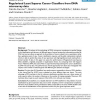Free Online Productivity Tools
i2Speak
i2Symbol
i2OCR
iTex2Img
iWeb2Print
iWeb2Shot
i2Type
iPdf2Split
iPdf2Merge
i2Bopomofo
i2Arabic
i2Style
i2Image
i2PDF
iLatex2Rtf
Sci2ools
143
click to vote
BMCBI
2005
2005
Regularized Least Squares Cancer Classifiers from DNA microarray data
Background: The advent of the technology of DNA microarrays constitutes an epochal change in the classification and discovery of different types of cancer because the information provided by DNA microarrays allows an approach to the problem of cancer analysis from a quantitative rather than qualitative point of view. Cancer classification requires well founded mathematical methods which are able to predict the status of new specimens with high significance levels starting from a limited number of data. In this paper we assess the performances of Regularized Least Squares (RLS) classifiers, originally proposed in regularization theory, by comparing them with Support Vector Machines (SVM), the state-of-the-art supervised learning technique for cancer classification by DNA microarray data. The performances of both approaches have been also investigated with respect to the number of selected genes and different gene selection strategies. Results: We show that RLS classifiers have performa...
Related Content
| Added | 15 Dec 2010 |
| Updated | 15 Dec 2010 |
| Type | Journal |
| Year | 2005 |
| Where | BMCBI |
| Authors | Nicola Ancona, Rosalia Maglietta, Annarita D'Addabbo, Sabino Liuni, Graziano Pesole |
Comments (0)

